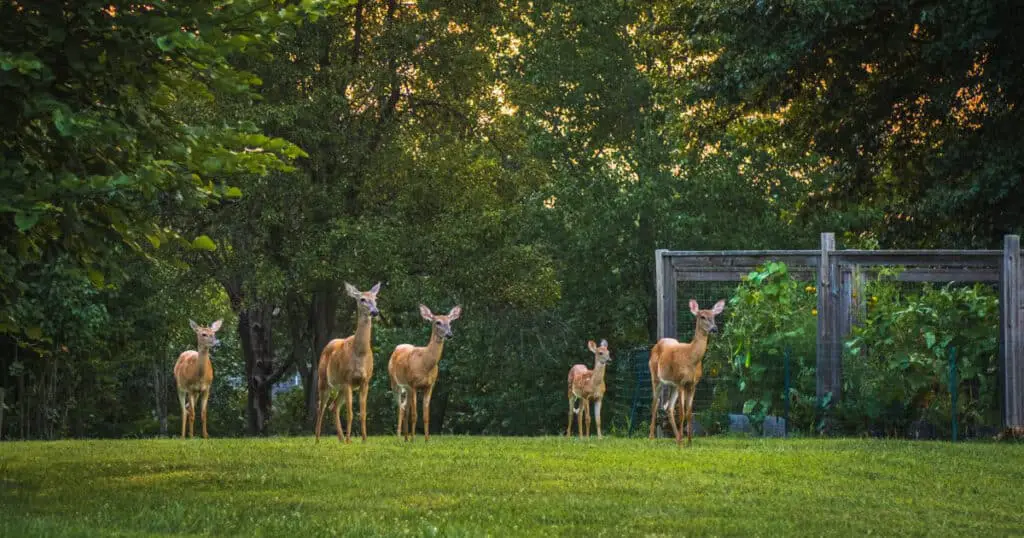Tomato growers with deer populations in the area should know that these animals will be tempted to help themselves to a meal. You should be aware of the deer diet so you can better understand what they’re likely to eat and what they will avoid. But do deer eat tomatoes? Keep reading to find out.
Yes, deer eat tomatoes. However, tomatoes are native to South America and they aren’t a natural part of the North American flora. That is why it’s not part of the preferred diet of White Tailed Deer and most other North American deer species.
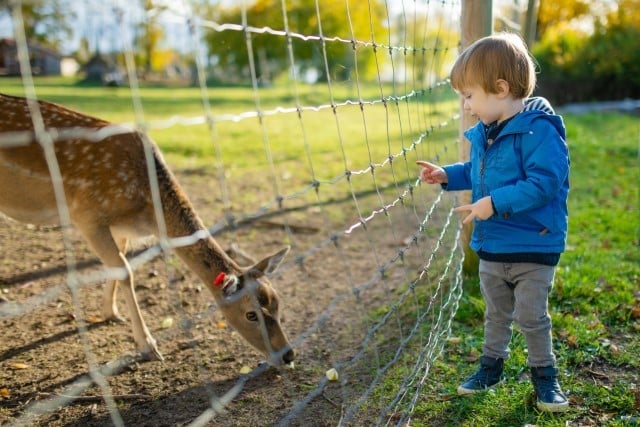
As deer haven’t evolved to favor tomatoes as a food source, they aren’t going to actively seek them out. However, if a deer finds a tomato in its path, there is a good chance it will try to eat it.
So, if you grow tomatoes on your property and you have deer populations nearby, you should be aware of the danger that cervids could invade your vegetable garden.
Are Tomatoes Good For Deer?
While they aren’t something a deer will commonly find in the wild, tomatoes are a nutrient-rich food for deer that can also be a great source of water.
If you have fed deer tomatoes, you shouldn’t be too worried about it causing any issues. They don’t contain anything toxic to deer, and they’re unlikely to cause any digestive issues unless consumed in vast quantities.
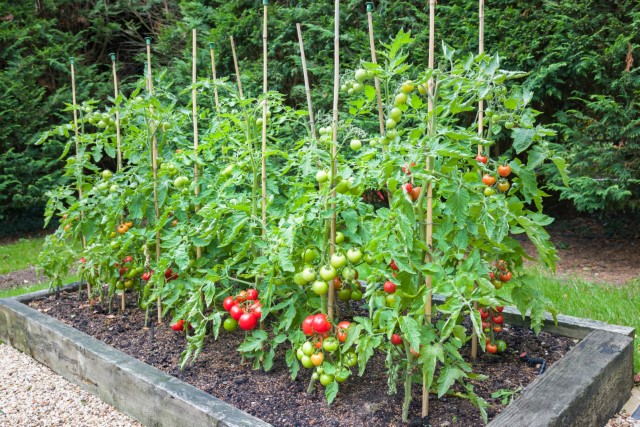
That said, it is important to remember that deer are grazing animals. You should avoid supplementing their diets with foods that don’t naturally occur in their habitat.
Tomatoes are a good source of important vitamins and minerals.
As long as the tomato isn’t overripe or squishy, it can actually be a good snack for deer. This is particularly true in hot summer weather.
If you find deer to feed and have a tomato to spare, they aren’t going to turn it down. Just be aware of the other food sources that deer may have access to, and don’t overdo it.
Tomatoes are brightly colored, which may tempt the curiosity of deer as they are often compelled to eat berries.
Deer are very curious and will almost always investigate anything they come across that looks interesting.
Should You Feed Tomatoes To Wild Deer?
No, you probably shouldn’t try feeding tomatoes to wild deer.
These are wild animals, so they can be unpredictable in many circumstances. Also, while tomatoes may not harm their health, it’s not the best food for them.
Something else to keep in mind is that we don’t want wild animals to feel dependent on getting their food from humans.
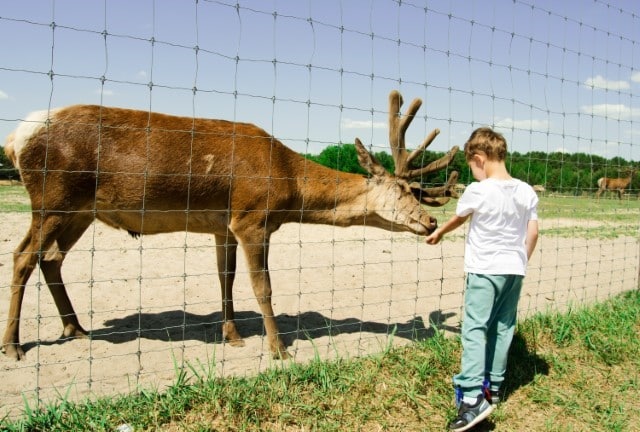
If you get into the habit of giving tomatoes (or other kinds of food) to deer, you will find that they constantly appear on your property. This may become dependent on you.
Deer are a very important part of our ecosystem, and interfering with their natural behavior can lead to a bigger problem down the line.
One situation in which you can feed tomatoes to deer is if you’re dealing with deer on a private reserve.
Male Deer May Be Aggressive
Another potential problem with feeding deer is the fact that male deer can be aggressive, especially during their annual mating season.
If you offer food to a male deer during this time of year, it could get aggressive with you and maybe even injure you. This could result in a dangerous situation.
Male deer have large antlers that can cause injury. Sudden movements can spook the deer, and they may try to stomp at you, or fight back rather than just flee.
Yet another reason you should refrain from giving tomatoes to deer is the fact that the more time these animals spend with humans, the more complacent they will become about being around us.
This can lead to danger for the animals. Deer that aren’t scared of humans will venture more into human territories, putting them at higher risk of being hit by a car.
Remember, it’s best to let wild animals find their own food sources, and we need to respect their natural environment.
Tomatoes aren’t a native food source in North America, and that is another reason you should probably avoid giving them to cervids.
What Should Deer Be Eating?
Deer are herbivores, and the typical deer diet is diverse and consists of a variety of plants, fruits, and nuts, including grass. Depending on the location they are in, deer will consume different items depending on what is available.
Time of year is another major factor when it comes to food availability. This is why deer eat different kinds of food at different times of the year.
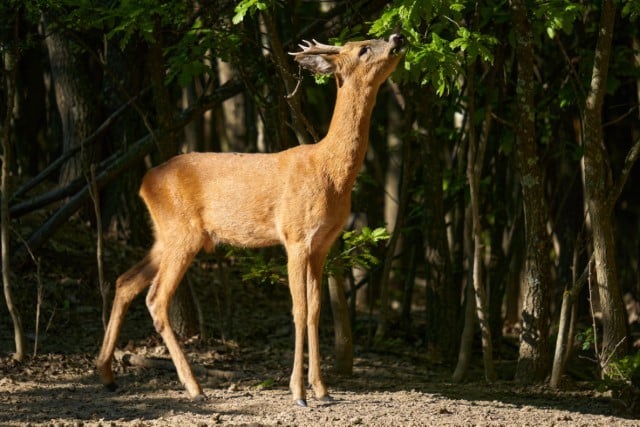
While tomatoes aren’t a major item on the list for deer, they are still a good fit for their nutritional needs if they stumble upon them in the wild.
As grazing mammals, deer eat a lot of green vegetation, such as grasses, shrubs, and leaves. If they have access to cultivated fields and meadows, deer will often feed around the outside and cause crop damage, but they aren’t likely to cause a significant issue.
Deer are also likely to eat berries, as well as roots and shoots, which are found throughout North America. These food sources are very high in nutrients, and deer prefer them above most other items.
If you’re growing lettuce, berries, or other tasty food that is normally in the books for deer, you may find that there is a lot more of a temptation to make their way over and help themselves.
While tomatoes are a great choice for deer and people alike, they are much more likely to steal your lettuce or cabbages.
There are plenty of options when it comes to deterring deer from eating food you grow, so it’s worth looking into if you’re having difficulty. Some of the easiest ways to deter deer, are to plant deer resistant perennials and annual flowers deer dislike around your property.
Do You Need to Protect Your Tomatoes From Deer?
If you’ve got a vegetable garden established, you are likely to find a tiny bit of interest from deer. Although other animals might be targeting your fruits and vegetables, deer are a very common sight amongst a lot of the US, especially if you’re growing things they love.
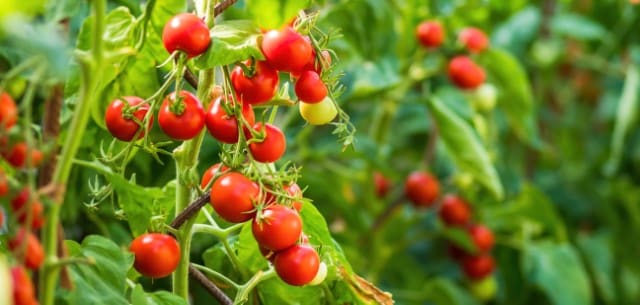
As I mentioned before, deer won’t usually seek out tomatoes. But if they’re hungry and are having trouble finding other food, they will certainly eat them.
Also, if you’re growing some of their favorite leafy greens near your tomatoes, they are more likely to end up on your property and may end up munching on everything in the vegetable garden.
If you have deer in your area, you should take steps to protect your vegetable garden, including your tomatoes. You should invest some time and energy in deterring cervids from your property.
You can protect your vegetable garden by adding plants that deter deer around the edges of the space. For example, you can plant certain deer repelling herbs.
Here are some examples of herbs that you can plant around your tomatoes. They’ll help keep away the local deer, and you can use them for your next delicious culinary creation with tomato.
Rosemary
You’ve probably used rosemary in the kitchen, and you can plant it on your property to help keep away cervids.

It is a strongly scented herb, and that is why deer dislike it. Mature rosemary will also grow purple blooms if you live in a warm region.
Sage
Like rosemary, sage has a strong scent that deer dislike so much that it will keep them away from your tomatoes.

It has a scent that most humans enjoy, so you will enjoy having it around. You can also use it for cooking.
Basil
Basil is similar to sage and rosemary in that it is a strong smelling herb that deer avoid.

Another way to keep deer out of your garden is by planting thorny berry bushes around the garden edges. Cervids dislike shrubs with thorns, and this will probably keep them away.
You can set up a fence, too. Deer can jump high, however, so you will have to make it high enough to keep them out.
For a fence to be able to keep out deer, it will have to be a minimum of 7 feet high.
If you have a smaller vegetable garden, you can also use netting to stop deer from raiding your tomato patch.
Final Thoughts: Do Deer Eat Tomatoes?
While tomatoes aren’t a natural part of a deer’s diet, an occasional tomato probably won’t hurt cervids. In fact, if a deer comes upon a tomato patch, there is a good chance they will have a snack.
That is why you should take measures to protect your tomato crop.
You should avoid feeding any kind of food to wild deer, and this includes tomatoes. Feeding deer may make them dependent on humans for food, and this can put them into danger.
Also, male deer can be aggressive and may cause injury if they feel threatened while you feed them.

